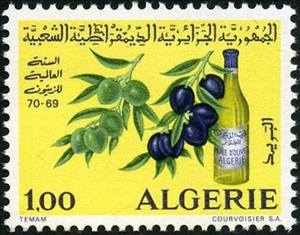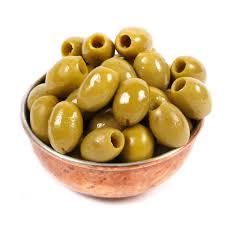Stamp: Olives, Oil Bottle (Algeria 1970)
Olives, Oil Bottle (Algeria 1970)
16 May (Algeria ) within release Fruits goes into circulation Stamp Olives, Oil Bottle face value 1 Algerian dinar
| Stamp Olives, Oil Bottle in catalogues | |
|---|---|
| Michel: | Mi:DZ 551 |
Stamp is square format.
|
Data entry completed
53%
|
|
|---|---|
| Stamp Olives, Oil Bottle in digits | |
| Country: | Algeria |
| Date: | 1970-05-16 |
| Print: | Photogravure |
| Perforation: | comb 12½ |
| Format: | Stamp |
| Face Value: | 1 Algerian dinar |
Stamp Olives, Oil Bottle it reflects the thematic directions:
Agriculture is the cultivation and breeding of animals, plants and fungi for food, fiber, biofuel, medicinal plants and other products used to sustain and enhance human life.[1] Agriculture was the key development in the rise of sedentary human civilization, whereby farming of domesticated species created food surpluses that nurtured the development of civilization. The study of agriculture is known as agricultural science. The history of agriculture dates back thousands of years, and its development has been driven and defined by greatly different climates, cultures, and technologies. Industrial agriculture based on large-scale monoculture farming has become the dominant agricultural methodology.
Food is any substance consumed by an organism for nutritional support. Food is usually of plant, animal, or fungal origin and contains essential nutrients such as carbohydrates, fats, proteins, vitamins, or minerals. The substance is ingested by an organism and assimilated by the organism's cells to provide energy, maintain life, or stimulate growth. Different species of animals have different feeding behaviours that satisfy the needs of their metabolisms and have evolved to fill a specific ecological niche within specific geographical contexts.
Flora is the plant life occurring in a particular region or time, generally the naturally occurring or indigenous—native plant life. The corresponding term for animal life is fauna. Flora, fauna and other forms of life such as fungi are collectively referred to as biota. Sometimes bacteria and fungi are also referred to as flora, as in the terms gut flora or skin flora.
The olive, botanical name Olea europaea, meaning 'European olive', is a species of small tree or shrub in the family Oleaceae, found traditionally in the Mediterranean Basin, with wild subspecies found further afield in Africa and western Asia. When in shrub form, it is known as Olea europaea 'Montra', dwarf olive, or little olive. The species is cultivated in all the countries of the Mediterranean, as well as in Australia, New Zealand, North and South America and South Africa. It is the type species for its genus, Olea. The tree and its fruit give their name to the Oleaceae plant family, which also includes species such as lilac, jasmine, forsythia, and the true ash tree.




